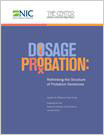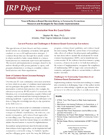Related Work
Dosage Probation: Rethinking the Structure of Probation Sentences
 This monograph provides a policy and practice framework upon which a new model of supervision—"dosage probation"—can be constructed. It offers a review of evidence-based approaches to reducing recidivism in our communities, the most recent research on dosage, and its applicability to sentencing and community supervision practices. It describes the model's promise for increasing community safety through recidivism reduction, as well as achieving fiscal savings by reducing periods of supervision. Finally, the monograph offers a summary of the work of Milwaukee County's criminal justice stakeholders as they design and conduct the nation's first dosage probation experiment.
This monograph provides a policy and practice framework upon which a new model of supervision—"dosage probation"—can be constructed. It offers a review of evidence-based approaches to reducing recidivism in our communities, the most recent research on dosage, and its applicability to sentencing and community supervision practices. It describes the model's promise for increasing community safety through recidivism reduction, as well as achieving fiscal savings by reducing periods of supervision. Finally, the monograph offers a summary of the work of Milwaukee County's criminal justice stakeholders as they design and conduct the nation's first dosage probation experiment.
Incarceration's Front Door: The Misuse of Jails in America
 Local jails, which exist in nearly every town and city in America, are built to hold people deemed too dangerous to release pending trial or at high risk of flight. This, however, is no longer primarily what jails do or whom they hold, as people too poor to post bail languish there and racial disparities disproportionately impact communities of color. This report reviews existing research and data to take a deeper look at our nation’s misuse of local jails and to determine how we arrived at this point. It also highlights jurisdictions that have taken steps to mitigate negative consequences, all with the aim of informing local policymakers and their constituents who are interested in in reducing recidivism, improving public safety, and promoting stronger, healthier communities.
Local jails, which exist in nearly every town and city in America, are built to hold people deemed too dangerous to release pending trial or at high risk of flight. This, however, is no longer primarily what jails do or whom they hold, as people too poor to post bail languish there and racial disparities disproportionately impact communities of color. This report reviews existing research and data to take a deeper look at our nation’s misuse of local jails and to determine how we arrived at this point. It also highlights jurisdictions that have taken steps to mitigate negative consequences, all with the aim of informing local policymakers and their constituents who are interested in in reducing recidivism, improving public safety, and promoting stronger, healthier communities.
Smart Supervision
 The U.S. Department of Justice (DOJ), Office of Justice Programs (OJP), Bureau of Justice Assistance (BJA) is seeking applications for Smart Supervision: Reducing Prison Populations, Saving Money, and Creating Safer Communities. This program furthers the Department’s mission by providing resources to states, units of local government, and federally recognized Indian tribes to develop more effective and evidence-based probation and parole practices that effectively address individuals’ needs and reduce recidivism.
The U.S. Department of Justice (DOJ), Office of Justice Programs (OJP), Bureau of Justice Assistance (BJA) is seeking applications for Smart Supervision: Reducing Prison Populations, Saving Money, and Creating Safer Communities. This program furthers the Department’s mission by providing resources to states, units of local government, and federally recognized Indian tribes to develop more effective and evidence-based probation and parole practices that effectively address individuals’ needs and reduce recidivism.
Toward Evidence-Based Decision Making in Community Corrections: Research and Strategies for Successful Implementation
 This special issue of Justice Research and Policy contains invited articles on community corrections, with special emphasis on successful implementation strategies. A common thread that runs through these articles relates to what is needed to better ensure fidelity to evidence-based practices in community supervision and treatment.
This special issue of Justice Research and Policy contains invited articles on community corrections, with special emphasis on successful implementation strategies. A common thread that runs through these articles relates to what is needed to better ensure fidelity to evidence-based practices in community supervision and treatment.
Measuring for Results: Outcome and Performance Measures for Pretrial Diversion Field
 This publication outlines suggested outcome and performance measures and critical operational data for pretrial diversion programs. Its goals are to present clearly defined and easily calculable measures that pretrial diversion programs can use to gauge progress in achieving their mission and strategic goals, improve business decisions, and illustrate pretrial diversion’s value in an evidence-based criminal justice system.
This publication outlines suggested outcome and performance measures and critical operational data for pretrial diversion programs. Its goals are to present clearly defined and easily calculable measures that pretrial diversion programs can use to gauge progress in achieving their mission and strategic goals, improve business decisions, and illustrate pretrial diversion’s value in an evidence-based criminal justice system.
Evaluation of Phase II Technical Assistance for Evidence-Based Decision-Making in Local Criminal Justice Systems
 This report describes the EBDM [Evidence-Based Decision-Making] Phase II technical assistance approach and presents findings and themes from the process evaluation and outcome assessment (conducted from October 2010 to February 2012) of the technical assistance delivered to the seven sites selected under Phase II of the EBDM initiative.
This report describes the EBDM [Evidence-Based Decision-Making] Phase II technical assistance approach and presents findings and themes from the process evaluation and outcome assessment (conducted from October 2010 to February 2012) of the technical assistance delivered to the seven sites selected under Phase II of the EBDM initiative.
Evaluation Brief: Evidence-Based Decision Making in Local Criminal Justice Systems Initiative
 This brief covers results from the report "Evaluation of Phase II Technical Assistance for Evidence-Based Decision-Making in Local Criminal Justice Systems" by Janeen Buck Willison, Pamela Lachman, Dwight Pope, and Ashleigh Holand (issued June 2012)
This brief covers results from the report "Evaluation of Phase II Technical Assistance for Evidence-Based Decision-Making in Local Criminal Justice Systems" by Janeen Buck Willison, Pamela Lachman, Dwight Pope, and Ashleigh Holand (issued June 2012)
